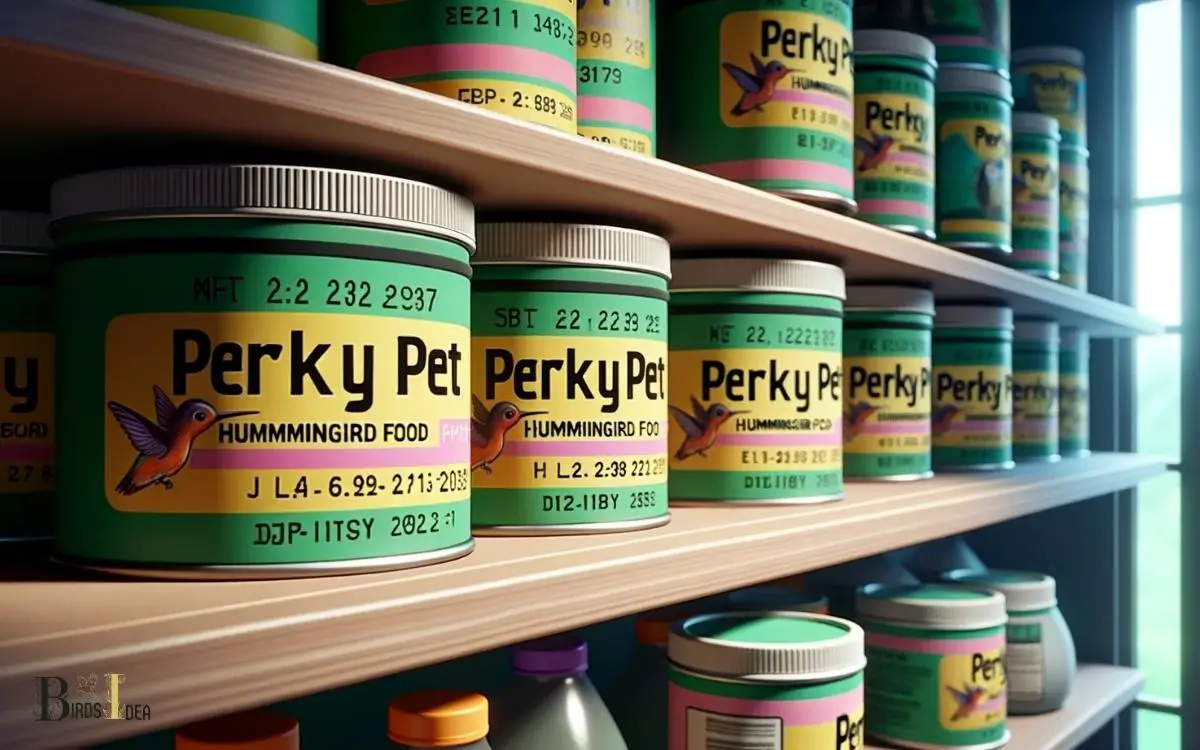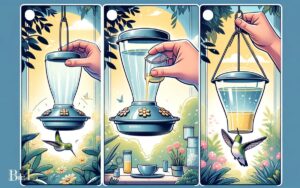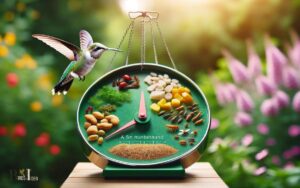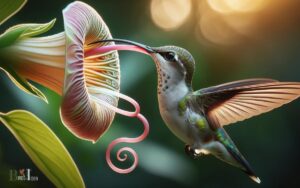Does Perky Pet hummingbird Food expire? Find Out!
Perky Pet Hummingbird Food does have an expiration date, and it is essential to check the packaging for this information to ensure the nectar’s freshness and safety for the hummingbirds.
The expiration of Perky Pet Hummingbird Food is influenced by several factors, including the manufacturing date, ingredients, and preservatives used in the nectar.
Once opened, the nectar should be used promptly, and any unused portion should be stored properly to prevent spoilage.
To identify expired hummingbird food, look for:
Proper storage techniques for extending the shelf life of the nectar include:
Always provide fresh nectar to hummingbirds by checking expiration dates and following proper storage practices for Perky Pet Hummingbird Food.

Key Takeaway
Perky Pet Hummingbird Food Shelf Life
The shelf life of Perky Pet Hummingbird Food typically ranges from 12 to 18 months when stored in a cool, dry place.
This duration ensures that the food maintains its nutritional value and remains safe for the hummingbirds.
It is essential for those who serve and care for these delicate creatures to be mindful of the expiration date on the packaging and to adhere to proper storage guidelines.
By doing so, they can ensure that the hummingbirds receive the best quality food, supporting their health and well-being.
Regularly checking the expiration date and properly storing the food not only benefits the hummingbirds but also reflects a dedication to providing excellent care and service to these beautiful creatures.
Factors Affecting Hummingbird Food Expiration
The expiration of hummingbird food is influenced by several key factors. The storage conditions, such as exposure to light and temperature fluctuations, can impact the shelf life of the food.
the quality of the ingredients used plays a crucial role in determining how long the hummingbird food remains viable for consumption.
Storage Conditions Impact Expiration
Proper storage conditions play a critical role in determining the expiration of Perky Pet hummingbird food.
To ensure the longevity and quality of the food, consider the following factors:
- Temperature: Store the hummingbird food in a cool, dry place away from direct sunlight and extreme temperatures. Fluctuations in temperature can negatively impact the food’s shelf life.
- Air Exposure: Seal the container tightly after each use to minimize air exposure. Oxygen can lead to oxidation, which may spoil the food more quickly.
- Contamination: Keep the food away from potential contaminants such as dirt, dust, or water. Ensure the storage area is clean and free from pests to prevent spoilage.
Quality of Ingredients Matters
Adherence to stringent standards for ingredient quality plays a crucial role in determining the expiration of Perky Pet hummingbird food.
The quality of ingredients directly impacts the overall stability and shelf life of the hummingbird food.
Fresh, high-quality ingredients are less likely to degrade quickly, ensuring the longevity of the product.
When manufacturers prioritize the use of pure cane sugar and filtered water, and avoid additives like dyes and preservatives, the resulting hummingbird food is more likely to maintain its nutritional value and freshness for an extended period.
The sourcing of ingredients from reputable suppliers further contributes to the quality and longevity of the product.
By focusing on ingredient quality, Perky Pet demonstrates a commitment to providing a reliable and long-lasting hummingbird food product, ultimately serving the needs of those who enjoy feeding and observing hummingbirds.
Signs of Expired Hummingbird Nectar
Expired hummingbird nectar exhibits visible signs of spoilage, such as discoloration or the presence of mold.
When assessing the freshness of hummingbird nectar, look for the following indicators:
- Change in Color: The nectar may become cloudy or develop a darker, murky color, signaling that it has gone bad.
- Presence of Sediments: If you notice a buildup of sediments at the bottom of the container, it is a clear sign that the nectar has deteriorated.
- Formation of Mold: Visible mold growth, either on the surface or within the nectar, is a definite indication of spoilage.
Maintaining the quality of hummingbird nectar is crucial for the well-being of these delightful birds.
By understanding the signs of expired nectar, you can ensure that only fresh and safe food is provided to the hummingbirds.
Now, let’s delve into the importance of proper storage of Perky Pet hummingbird food.
Proper Storage of Perky Pet Hummingbird Food
When it comes to ensuring the quality and longevity of Perky Pet Hummingbird Food, proper storage is essential.
This includes adhering to shelf life guidelines, selecting suitable storage containers, and being mindful of temperature fluctuations.
By following these key points, hummingbird enthusiasts can maintain the freshness and nutritional integrity of the nectar, thereby providing a welcoming environment for these delightful creatures.
Shelf Life Guidelines
Proper storage of Perky Pet Hummingbird Food is essential for maintaining its shelf life.
To ensure the longevity and quality of the food, follow these guidelines:
- Store in a cool, dry place away from direct sunlight to prevent spoilage and maintain freshness.
- Seal the packaging tightly after each use to prevent exposure to air and moisture, which can lead to degradation of the food.
- Use the oldest food first to maintain freshness and prevent the food from exceeding its shelf life.
Storage Container Recommendations
To ensure the optimal preservation of Perky Pet Hummingbird Food, use a tightly sealed, airtight container for storage.
This will help maintain the quality and freshness of the food, ensuring that it remains enticing for the hummingbirds.
When selecting a storage container, opt for one that is specifically designed for food storage and is made of a durable, non-reactive material such as glass or BPA-free plastic.
It’s important to choose a container that is easy to clean and sanitize to prevent any contamination.
Consider the size of the container to ensure it can hold the amount of food you typically use, and that it fits well in your storage area.
Proper storage containers will help maintain the quality of the hummingbird food, ensuring that it remains appealing and nutritious for the birds.
We will delve into the impact of temperature fluctuations on the storage of Perky Pet Hummingbird Food.
Impact of Temperature Fluctuations
The storage of Perky Pet Hummingbird Food is significantly impacted by temperature fluctuations, necessitating careful attention to maintain its quality and appeal to hummingbirds.
Avoid Extreme Temperatures
- Store the hummingbird food in a cool, dry place away from direct sunlight to prevent spoilage due to heat exposure.
- Extreme cold can cause the solution to freeze and expand, potentially damaging the storage container.
Use Insulated Containers
Consider using insulated containers to regulate temperature fluctuations, especially in regions with varying weather conditions.
Regularly Monitor Storage Conditions
Check the storage area regularly to ensure it remains within the recommended temperature range for the hummingbird food.
To maintain the quality and appeal of the Perky Pet Hummingbird Food, it’s essential to consider the impact of temperature fluctuations on its storage.
Proper storage conditions are vital to ensure the longevity and effectiveness of the product, as discussed in the subsequent section about ‘extending the shelf life of hummingbird nectar’.
Can I still use expired Perky Pet hummingbird food?
Expired Perky Pet hummingbird food may not be the best choice for your fluttering friends. The hummingbird food longevity can be compromised after the expiration date, affecting the nutritional value and taste. It’s recommended to use fresh nectar to ensure the birds get the proper nutrients they need for their energetic lifestyle.
Consequences of Consuming Expired Hummingbird Food
Potential Harm to Hummingbirds
- Nutritional Degradation: Expired hummingbird food may experience a decline in nutritional quality, potentially lacking essential nutrients crucial for hummingbirds’ health.
- Toxicity Concerns: Over time, the ingredients in hummingbird food can break down, leading to the formation of harmful substances. Consuming such substances may be toxic for hummingbirds.
- Weakened Immune System: Ingesting expired food may compromise the hummingbirds’ immune system, making them more susceptible to diseases and infections.
- Impact on Reproductive Health: Continuous consumption of degraded food may affect the reproductive health of hummingbirds, potentially leading to issues in breeding and population growth.
Impact on Hummingbird Feeding Habits
- Altered Foraging Behavior: Hummingbirds rely on consistent food sources. The expiration of their usual food may disrupt their foraging habits, forcing them to find alternative, potentially less nutritious, or less suitable food.
- Reduced Feeding Frequency: If the available food is expired or lacks freshness, hummingbirds may reduce their feeding frequency, leading to energy depletion and negative health consequences.
- Migration Challenges: For migratory hummingbird species, relying on compromised food sources can impede their energy levels, making migration more challenging and putting additional stress on their already demanding journey.
Importance of Maintaining Fresh and Safe Food Sources
- Overall Health and Well-being: Fresh and safe food is essential for maintaining the overall health and well-being of hummingbirds. It supports their energy levels, reproductive success, and immune system functionality.
- Conservation of Hummingbird Species: Ensuring a stable and reliable food supply contributes to the conservation of hummingbird species. Healthy populations are crucial for the ecological balance of their habitats.
- Educational Outreach: Emphasizing the importance of fresh and safe hummingbird food can lead to increased awareness among bird enthusiasts, fostering responsible practices and care for these unique and delicate creatures.
Conclusion
It is important to be mindful of the shelf life of Perky Pet hummingbird food and to consider the factors that can affect its expiration.
Proper storage and regular testing of the freshness of the nectar are crucial in ensuring that it remains safe and beneficial for the hummingbirds.
Just like how we carefully store our own food to keep it fresh, it is important to do the same for the hummingbird nectar to maintain its quality.






